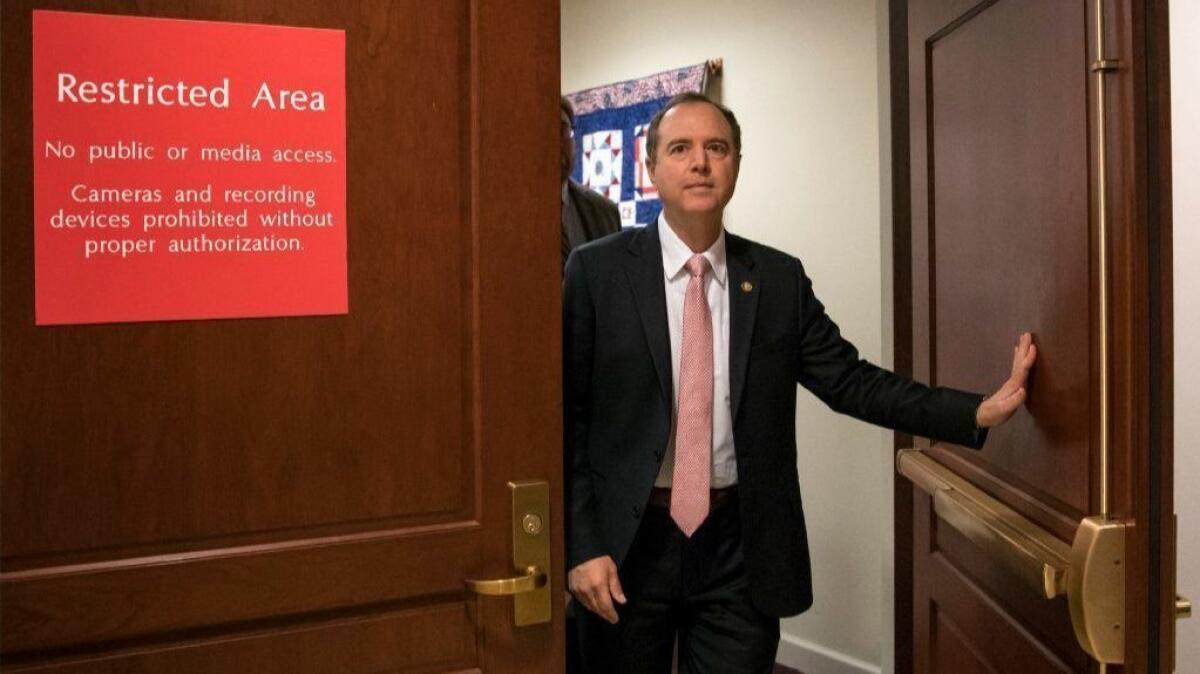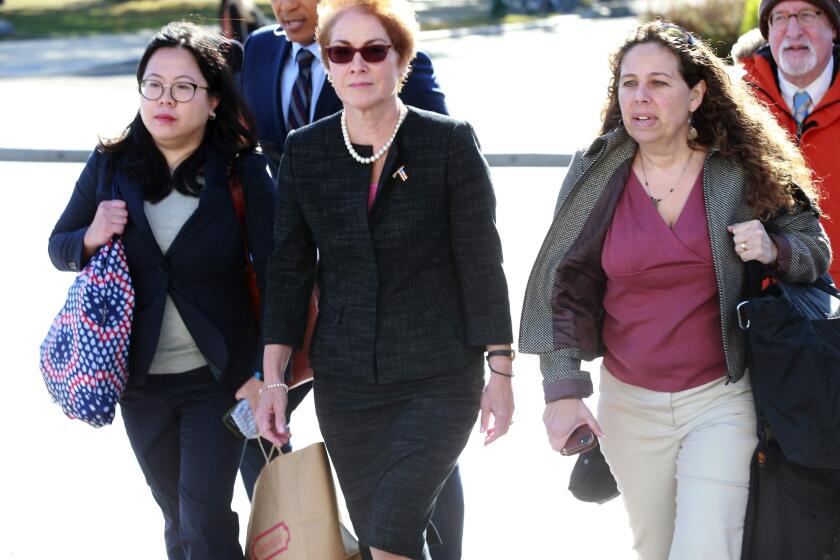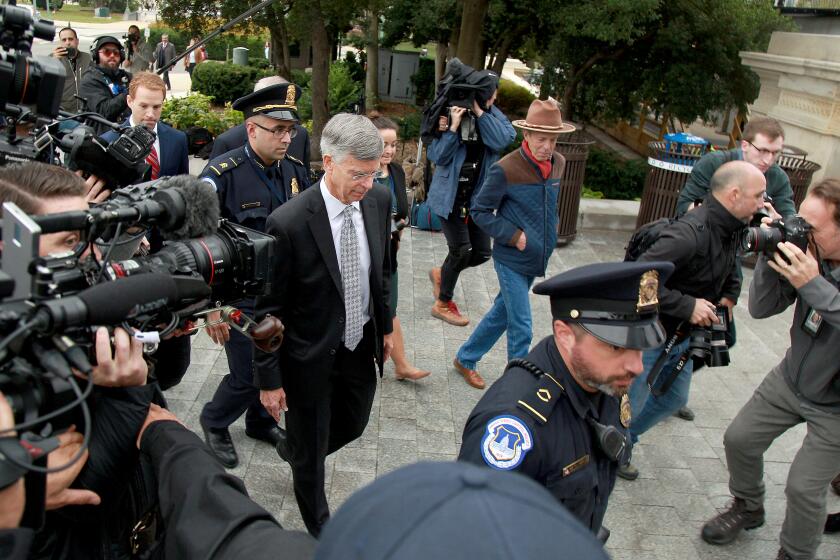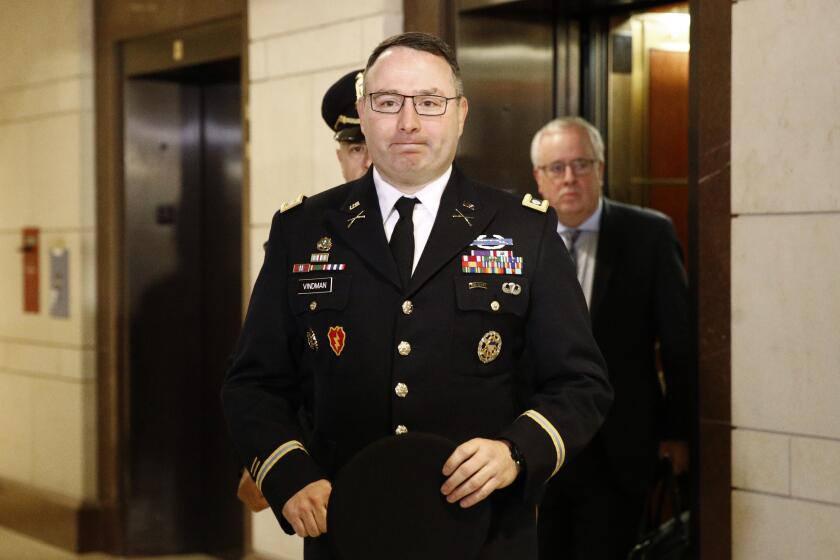A dummy’s guide to the impeachment hearing

WASHINGTON — The public impeachment hearings that start today have been ballyhooed as the greatest threat to President Trump since … well, since special counsel Robert S. Mueller III testified before Congress in July.
We all know how that ended. Mueller refused even to read from his own report.
These hearings won’t produce that kind of belly flop. But they are unlikely to lead to Trump’s removal from office.
The proceedings will be invaluable, however, if they help Congress and the public answer two critical questions and bring coherence to a convoluted story.
The public impeachment inquiry hearings will start this week with testimony from three State Department officials
First, how many rules of statecraft did Trump break when he asked Ukraine’s president to investigate Joe Biden and the Democratic Party after Trump had blocked U.S. military aid the country desperately needed?
And second, does Trump’s not-so-subtle attempt at extortion justify his impeachment and removal from office?
The first hearing is aimed mainly at laying out Trump’s actions and intentions. What Congress should do about it, which is harder to answer, comes later.
Unless you’ve plugged your ears to avoid the news, don’t expect dramatic revelations. The first two witnesses already testified to the committee behind closed doors, and the transcripts were released.
But now the public will see and hear them for the first time. Two highly regarded diplomats, William B. Taylor Jr. and George Kent, will try to turn the Ukraine saga into a straightforward narrative that Americans can understand.
Rep. Adam B. Schiff (D-Burbank), who will lead the hearing as chairman of the House Intelligence Committee, will ask them whether Trump’s actions damaged or endangered U.S. national security given bipartisan support for the struggling democracy as it battles Russian-backed insurgents.
They will say yes, and explain why. That’s why Schiff made them the lead witnesses.
Taylor has emerged as a key witness in the impeachment inquiry after delivering explosive closed-door testimony to congressional investigators Oct. 22.
If Schiff and other Democrats can convince viewers — or at least those who haven’t already made up their minds — that Trump blocked Ukraine’s military aid to serve his 2020 reelection campaign, they’ll be halfway to their goal.
If the last few weeks are any guide, the president’s defenders will try to deflect or discredit the damaging narrative. That’s their goal. And they’ll complain about the process, often a tell when you can’t win on the substance.
They may try to sidetrack the proceedings by demanding that Hunter Biden, who landed a dubious $50,000-a-month job with a Ukrainian gas company, be hauled into the dock. Most voters will recognize that as an attempt to change the subject.
If Trump’s defenders are smart, they won’t waste much time claiming that the president wasn’t demanding a quid pro quo from Ukraine; the record on that is too clear.
Instead, they’ll try to buttress their fallback positions.
They’ll ask whether corruption in Ukraine was a valid concern for U.S. officials — and both Taylor and Kent will affirm that yes, corruption was a problem.
That will be intended as groundwork for the argument that Trump was concerned about corruption generally, not the Democrats in particular.
Democrats and Republicans at the public impeachment hearing will battle for the support of Americans who haven’t made up their minds about removing President Trump.
Republicans may also seek evidence that the Ukrainians didn’t know that Trump was blocking the nearly $400 million in security aid, so it couldn’t have been part of a quid pro quo.
But the evidence is mixed on when the Ukrainians got wind of the problem. And it’s a curious defense because it boils down to this: Yes, Trump tried to use U.S. aid as leverage to boost his political campaign, but only for a short time — and he stopped when he got caught.
Notice something about those defense arguments? They don’t really deny the facts of the case.
Instead, they head toward dismissing Democrats’ concerns as unimportant — or, more to the point, unimpeachable. It’s not about the facts. It’s about value judgments.
In that way, Trump’s impeachment is starting to look like President Clinton’s in 1998. Democrats didn’t really deny that Clinton had lied about an affair with an intern. They said, in effect, so what?
Trump clearly did what he’s accused of doing. The White House memorandum of Trump’s July 25 phone call with Ukraine’s leader shows he asked for an investigation of Biden and Democrats in response to a request for military help. The question is whether the public decides his misdeeds mean he’s got to go.
Sen. Rob Portman (R-Ohio), who would be a juror if the House impeaches the president and the case moves to the Senate for trial, has staked out a middle ground.
“The president should not have raised the Biden issue, period. It’s not appropriate for a president to engage a foreign government in an investigation of a political opponent,” Portman said recently. But he added, “I don’t view it as an impeachable offense.”
He hasn’t said why. But at least his position is more coherent than that one of Trump’s most ardent defenders, Sen. Lindsey Graham (R-S.C.): “I made my mind up. There’s nothing there.”
Rudolph Giuliani’s efforts to affect U.S. policy in Ukraine worried Lt. Col. Alexander S. Vindman and White House advisor Fiona Hill, according to transcripts.
They’re both tiptoeing around the harder questions.
Did Trump’s conduct add up to Alexander Hamilton’s definition of an impeachable offense, “the abuse or violation of some public trust?”
Or what George Mason, the great conservative leader of the time, described as “attempts to subvert the constitution?”
Let’s hope this week’s hearings, and the debate that follows, provide more conclusive answers than Mueller did.
More to Read
Get the L.A. Times Politics newsletter
Deeply reported insights into legislation, politics and policy from Sacramento, Washington and beyond. In your inbox three times per week.
You may occasionally receive promotional content from the Los Angeles Times.















